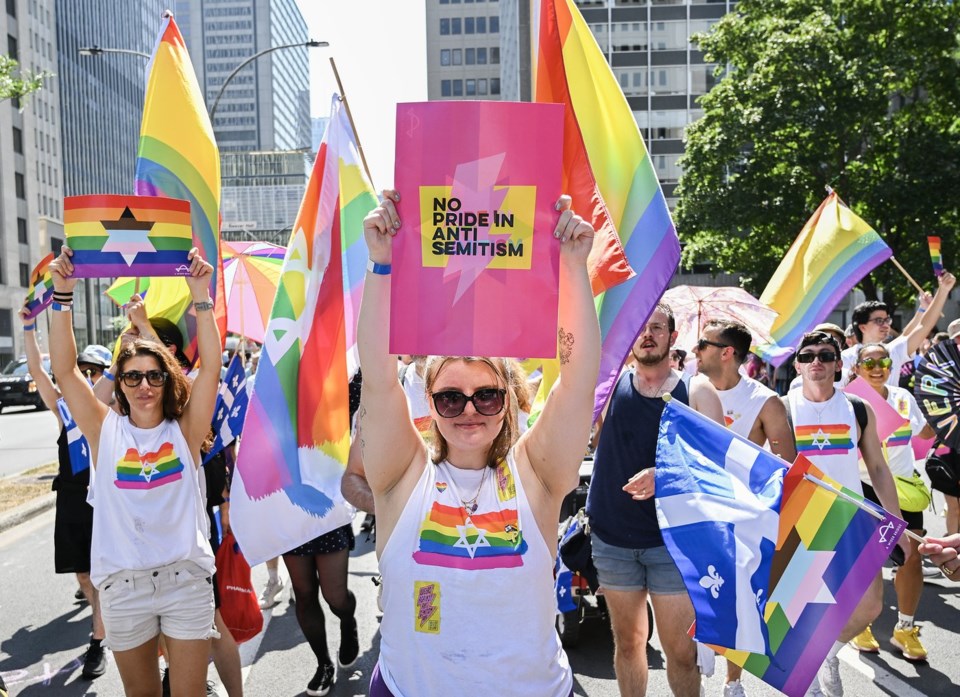MONTREAL — Downtown Montreal was awash with rainbow flags on Sunday as thousands of LGBTQ+ community members and their supporters took to the streets for the annual Pride parade.
Cheering crowds lined the streets as activists, politicians and brightly costumed performers joined a march that stretched over more than two kilometres.
Neither the summer heat nor the controversies that had threatened to mar the event appeared to deter the participants, who spoke of the importance of Pride events in both celebrating the LGBTQ+ community and reaffirming its rights.
Gregg Blachford, a member of LGBTQ+ seniors group Gay and Grey, says the event for him is all about good energy and fun for people of different ages.
"We get together for Pride once a year to celebrate with the whole crowd, to come out as not only gay and proud, but out as old guys and women," he said.
Joining parades is important because "it tells other people, perhaps that are younger, that there's hope, we can still have hope after 40, that there's lots of energy and things we can do," Blachford said, who has participated in various Pride events since the 1970s.
Rose-Marie Lévesque, who attended the march, said the event was especially important at a time when LGBTQ+ rights are being challenged in some parts of the world.
"I think it's really important to stand up and show our colours," Lévesque said. "Most of us don't necessarily feel safe, but that doesn't mean we should stop ourselves from coming out to march today."
Montreal's mayor echoed that sentiment at a news conference ahead of the event. "Unfortunately across the world, in many societies, in many cities and places we see a clear setback of rights for people from LGBTQIA2S+ communities, and that’s unacceptable," said Mayor Valérie Plante.
Marlot Marleau, the president of organizing group Fierté Montreal, said the theme of the year's event is "Blossom here, now." He said the theme symbolizes "claiming our right to shine fully and to love in complete freedom."
The mood on the street was upbeat despite controversies in recent days that threatened to overshadow the event.
The marchers included members of Jewish LGBTQ+ group Ga’ava, which was briefly banned from attending over comments its president made about pro-Palestinian groups.
Organizer Fierté Montréal reversed the ban last week and reaffirmed that “all communities” were welcome to participate in the events for the 11-day festival.
Carlos Godoy, the president of Ga'ava, said the group had briefly debated whether to rejoin the march, but felt it was important for its members.
"LGBTQ Jews belong in the Pride parade, and whether it was our decision or someone else's decision to exclude us, LGBTQ Jews would have been really hurt by this," he said. "We belong in the spaces where we belong, and that's why we're here."
Godoy has acknowledged being critical of pro-Palestinian activists who protested last year's pride event, but denies ever having engaged in hate speech. Of those who criticize him, he said, "they have the right to their beliefs, and they also have the right to be in the Pride parade."
As the group marched in the parade, they were met by cheers but also by a person who yelled "Free Palestine!"
One of the group members called back, answering, "we believe in the same things, thanks for coming to Pride."
Amid the blaring pop music, dancing and fun, there were other echoes of global conflicts, including a group marching with a "Freedom for Iran," banner and another holding signs reading "Free Ukraine and Free Gaza."
Some LGBTQ+ groups decided to cut ties with Fierté Montreal and attend an alternative event instead after writing a letter earlier this year denouncing what they called a "toxic organizational culture."
Wild Pride describes itself online as "a radical, anti-colonial, anti-capitalist, anticorporate, and uncompromising Pride."
"It’s not a stage for banks or rainbow logos to whitewash corporations complicit in exploitation, dispossession, and genocide," the site reads.
An attendee of Wild Pride, who gave their name as Emilia, said the alternate event better represents their values, especially when it comes to "a free Palestine." Emilia said they would consider attending the main event again if it becomes "anti-cop, a Pride march that supported Palestine, that's really focused on liberation," but supports multiple events in the meantime.
Back at the main parade, Marie-Pier Boisvert, who heads an organization representing LGBTQ+ families, acknowledged feeling "torn" about the event.
She said she believed there would be "difficult conversations" to have with Pride organizers after the event, but had felt it was important to give her group members the chance to march and showcase Quebec's diverse LGBTQ+ families, as it does every year.
This report by The Canadian Press was first published Aug. 10, 2025.
Morgan Lowrie, The Canadian Press



